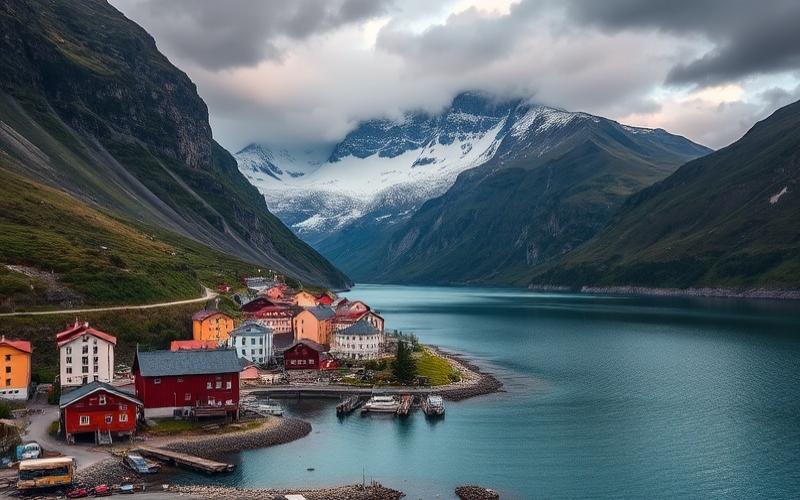
 Published on and written by Cyril Jarnias
Published on and written by Cyril Jarnias
Investing in real estate abroad may seem like a major challenge, but when the destination is Norway, a country known for its high quality of life and spectacular landscapes, the opportunity becomes even more attractive.
For expatriates, navigating the Norwegian real estate market requires a thorough understanding of local specificities, legal regulations, and the diversity of available properties, ranging from modern apartments in Oslo’s bustling streets to charming traditional houses overlooking picturesque fjords.
With its economic strengths, Norway offers numerous opportunities for savvy investors to make promising investments while benefiting from political stability and a robust economy.
This article aims to guide expatriates through the essential steps of real estate investment in Norway, providing practical advice and key information to succeed in this ambitious venture.
Understanding the Legal Framework for Buying Real Estate in Norway for Expatriates
Norway offers a relatively open legal framework for foreign investors wishing to acquire real estate. The Norwegian real estate market is governed by a transparent and well-structured legal system that applies equally to Norwegian citizens and non-residents.
Legal Framework and Laws Governing Real Estate
The Norwegian legal system is based on several fundamental laws that govern real estate transactions. The Sale of Property Act (Avhendingslova) is the central text, defining the obligations of sellers and buyers, including the seller’s obligation to provide detailed information about the property’s condition and any potential defects. The Planning and Building Act (Plan- og bygningsloven) establishes the zoning and construction rules applicable to all real estate projects. Finally, the Land Registration Act (Tinglysingsloven) governs the registration of property titles and mortgages with the Norwegian Land Registry.
Market Accessibility for Foreigners
Foreigners can acquire real estate in Norway without major restrictions, enjoying the same rights as Norwegian citizens for purchasing residential or commercial properties. There is no minimum investment requirement, real estate-related visa requirement, or mandatory minimum stay duration. This market openness represents a considerable advantage compared to some European countries that impose restrictions on non-resident investors.
However, a few exceptions remain: purchasing agricultural or forest land requires prior authorization, some strategic or military areas may be off-limits to foreigners, and certain municipalities may impose restrictions on secondary residences. Additionally, acquiring properties in sensitive border areas may require special permission.
Differences Between Norwegian and Non-Resident Buyers
Although property rights are identical, several practical distinctions apply to non-residents. Foreign buyers must obtain a national identification number (personnummer) or a Norwegian tax identification number (D-nummer) to finalize a transaction.
Regarding financing, credit conditions differ significantly: mortgage loans for non-residents are generally limited to 60-65% of the property’s value, compared to potentially more favorable conditions for residents. It is recommended to have a personal down payment of at least 15-25% of the purchase price. Furthermore, non-residents must demonstrate a credit history of at least 3 to 5 years to obtain a mortgage loan.
Tax Obligations and Tax Regime
Norway applies a generally favorable tax regime for real estate investors, with important particularities to consider.
| Tax Aspect | Details |
|---|---|
| Stamp Duty | No stamp duty on purchase, unlike many European countries |
| Registration Fees | Approximately 0.2% of the property value |
| Real Estate Capital Gains | Taxed at 22% for non-residents upon resale |
| Wealth Tax | 0.85% on net real estate value exceeding 1.7 million kroner (approximately €150,000) |
| Rental Income | Taxed at a minimum rate of 20% for expatriates, whether furnished or unfurnished rental |
| Property Tax | Applicable in certain municipalities |
The absence of stamp duty constitutes a significant advantage for foreign investors, significantly reducing acquisition costs compared to other European countries.
Administrative Process and Required Documents
The purchase of real estate in Norway follows a structured and transparent process. Real estate agents are mandatory and play a central role in the process.
The main steps are as follows:
- Identifying a property and negotiating with the seller or real estate agent
- Submitting a written offer in response to the asking price
- Signing a preliminary contract (kjøpekontrakt) setting the sale conditions and timeline
- Paying a deposit (generally 10% of the price)
- Engaging a Norwegian lawyer to conduct due diligence
- Conducting a comprehensive audit of the property (technical inspection, legal verification)
- Transferring the total amount to an escrow account during the final signing
- Registering the transaction with the Norwegian cadastre
Essential documents to provide include:
- Valid passport or identity card
- Proof of residence in home country
- Bank statements or financing certificate
- Norwegian tax identification number (D-nummer)
- Power of attorney if the buyer cannot be present for signing
Access to Bank Credit for Non-Residents
Norwegian banks can grant mortgage loans to foreign buyers, although conditions are generally stricter than for residents. The main constraints are:
- Financing cap limited to 60-65% of the property value, requiring a substantial personal contribution
- Credit history requirement of at least 3 to 5 years
- Strict financial documentation required
- Recommended personal contribution of 15-25% of the purchase price
It is highly recommended to contact Norwegian banks directly to obtain the best conditions and understand the specific approval criteria for non-residents.
Legal Recourses in Case of Disputes
Although detailed information about specific recourse for expatriates is not exhaustively developed in available sources, the Norwegian legal system offers substantial guarantees to buyers. It is strongly recommended to hire a lawyer specialized in real estate law to navigate the purchase process and ensure compliance with all legal requirements. This professional support is essential for:
- Verifying the legality of the transaction
- Conducting complete due diligence
- Protecting the buyer’s rights
- Resolving potential disputes with the seller or authorities
The Sale of Property Act (Avhendingslova) provides a protective framework precisely defining the rights and obligations of each party, thus offering a solid foundation in case of disagreement.
Good to know:
Expatriates wishing to buy in Norway must be aware of the Land Registration Act, comply with the registration tax, and note that access to bank credit may be restricted for non-residents. Specialized legal advice is recommended to navigate regulatory differences and prepare the necessary documents for purchase.
Administrative Procedures for Investing as a Foreigner in Norway
Legal Framework and Market Openness
Norway offers a real estate market that is largely open to foreign investors, without imposing significant restrictions on non-residents. Unlike many countries, foreigners benefit from the same rights as Norwegian citizens to acquire real estate, whether it’s a primary residence, vacation home, or rental property. No minimum stay duration is required to own property in Norway.
However, a few important exceptions frame this freedom:
- The acquisition of agricultural or forest land is subject to prior authorization
- Certain municipalities may impose restrictions on purchasing secondary residences
- Strategic or military areas may be prohibited to foreign buyers
- Properties located in sensitive border areas may require special permission
Mandatory Documents and Identifiers
To complete a real estate purchase in Norway as a foreigner, you must provide a series of essential documents:
| Document | Description |
|---|---|
| Passport or identity card | Valid identity document |
| Proof of residence | Proof of residence in your home country |
| Bank statements | Financing certificate or financial capacity proof |
| Norwegian tax identification number | D-nummer, obtained from the tax administration |
| Power of attorney | Required if you cannot be present for signing |
In addition to these documents, you must obtain a Norwegian national identification number (personnummer or D-nummer) to finalize the real estate transaction. You will also need to register with the Norwegian Land Registry.
Purchase Process Steps
The real estate acquisition process in Norway follows a well-defined structure:
Search and Purchase Offer
Start by defining your criteria (location, property type, budget) and enlist a local real estate agent (eiendomsmegler). Websites Finn.no and Eiendomsverdi.no are excellent resources for exploring the market. Once you find a property, participate in organized viewings (visning). In Norway, auctions are common and prices can rise quickly, with offers typically submitted by SMS the day after the final viewing.
Preliminary Contract and Negotiation
After your offer is accepted, a preliminary contract (kjøpekontrakt) is signed between the parties. This document sets the sale conditions and transaction timeline. The Sale of Property Act (Avhendingslova) governs these transactions and requires the seller to provide detailed information about the property’s condition.
Financing and Due Diligence
If you need a loan, contact Norwegian banks to obtain a finansieringsbevis (financing proof). Note that mortgage loans for non-residents are generally limited to 60-65% of the property value. Have a comprehensive audit of the property conducted by professionals (technical inspection, legal verification) to avoid unpleasant surprises.
Signing and Registration
On signing day, you must transfer the purchase amount to an escrow account. The property transfer will then be registered with the Norwegian cadastre.
Role of Legal Professionals
It is strongly recommended to hire a local lawyer specialized in real estate law to guide you through the procedures. The lawyer will play a crucial role in the legal verification of the property, contract negotiation, and property registration. Lawyer fees constitute additional costs to anticipate in your overall budget.
In Norway, unlike France, a notary does not intervene systematically. The process relies more on lawyers and real estate agents to oversee the transaction.
Specific Considerations: Selveier vs Andel
Two forms of ownership exist in Norway:
Selveier: You are the owner in the classical sense. This form of purchase incurs a purchase tax (dokumentsavgift) of 2.5% and allows you to avoid forkjøpsrett.
Andel: Ownership is shared in the form of a cooperative (borettslag), and you become a shareholder of this cooperative. This structure is common in Norway and offers certain advantages in terms of collective management.
Forkjøpsrett is an important system to know. If the property is subject to this preemption right, associations like OBOS or USBL manage the sale. After your winning bid, these associations contact their interested members in order of seniority to offer them the purchase at your offer price. If a member accepts, the sale is awarded to them. Always check for the “Forkjøpsrett” mention in the Finn.no listing. Foreigners can become members of these associations with an annual membership fee (approximately 200 NOK), but start at a disadvantage due to the seniority of existing members.
Taxation and Fees
Major advantage: Norway does not apply stamp duty on real estate purchases, unlike many countries. Only moderate registration fees (approximately 0.2% of the property value) are to be expected.
However, other taxes apply:
| Type of Tax | Rate/Amount | Description |
|---|---|---|
| Dokumentsavgift (Selveier) | 2.5% | Purchase tax for classic property |
| Registration fees | ~0.2% | Administrative fees |
| Real estate capital gains | 22% | Applied to non-residents upon resale |
| Real estate wealth tax | 0.85% | On net value exceeding 1.7 million NOK (~€150,000) |
Capital gains tax reductions are possible depending on the holding period of the property.
Financing and International Payments
Real estate payments to Norway from abroad are made via escrow/client accounts. The settlement schedule must be clearly established in the contract. International transfers are generally made via SWIFT or SEPA transfers, with exchange rate (currency/FX) considerations to take into account.
Resources for Expatriates
Although sources do not explicitly mention dedicated assistance offices, several resources are available:
- Real estate websites like Finn.no and Eiendomsverdi.no for property search
- Local real estate agents (eiendomsmegler) for support
- Lawyers specialized in real estate law for legal procedures
- The Norwegian tax administration for obtaining the D-nummer
- Expatriate communities that can provide practical advice
Timeline and Duration of Procedures
Although sources do not specify the exact duration of the complete process, the real estate purchase process in Norway is described as “relatively simple and transparent” for foreign investors. However, several steps must be followed: property search, viewings, auctions, signing the preliminary contract, financing, due diligence, and finally signing the deed of sale. Each step requires time, and it’s prudent to plan for several weeks for the entire process, depending on the case complexity and responsiveness of involved parties.
By following these steps and surrounding yourself with competent professionals, you’ll maximize your chances of successfully realizing your real estate investment project in Norway with complete peace of mind.
Good to know:
Foreigners must obtain a Norwegian identification number to register a property and are required to pay a 2.5% transfer tax; it is advisable to consult a local notary to verify specific restrictions and facilitate the process. Use the Altinn portal to access online administrative services and contact local municipal assistance offices for personalized advice.
International Financing Strategies for Non-Resident Real Estate Purchase
Financing Options for Non-Residents
Norwegian banks offer financing solutions to foreign investors, although conditions differ slightly from those offered to residents. Real estate financing for non-residents in Norway is accessible but requires careful preparation and understanding of local market specificities.
Eligibility Criteria and Basic Requirements
To access real estate financing in Norway as a non-resident, you must meet several fundamental criteria. Norwegian banks evaluate your overall financial situation, including employment stability, regular income, savings capacity, and credit history. A solid financial situation constitutes the first pillar of a successful application.
Some institutions require the borrower to have an established connection with Norway, whether employment, family ties, or professional presence in the country. This requirement varies by bank, and it’s advisable to check directly with the concerned financial institution.
Deposit Requirements
Personal contribution constitutes a critical element of real estate financing for non-residents in Norway. Unlike Norwegian residents, foreign investors generally need to provide a larger down payment.
| Property Type | Minimum Contribution | Maximum Contribution |
|---|---|---|
| Primary Residence | 25-40% | – |
| Rental Investment | Up to 50% | – |
Mortgage loans for non-residents are generally limited to 60-65% of the property value. This limitation reflects the perceived risk by banks when financing foreign buyers. Planning for a substantial contribution significantly improves your approval chances and may allow you to negotiate more favorable conditions.
Interest Rates and Loan Conditions
Interest rates applied to non-residents may be slightly higher than those granted to Norwegian residents. This difference compensates for the additional perceived risk by banks. Loan conditions vary by financial institution, hence the importance of comparing several offers before making a decision.
Documents Required for Approval
To build a solid application and increase your chances of obtaining financing, prepare the following documents:
- Valid identity document (passport or identity card)
- Income proofs from the last three years (pay stubs, tax notices)
- Bank statements from the last six months
- Complete details of your assets and liabilities (savings, investments, other properties, debts)
- Employment contract or proof of stable employment
- Details of the real estate property you wish to acquire
- Proof of your personal contribution
- Credit history from your home country
- Certified translations of documents not written in Norwegian or English
Using Mortgage Brokers and Specialized Institutions
The intervention of a local mortgage broker proves particularly beneficial for foreign investors. A professional well-versed in the Norwegian market can effectively navigate the subtleties of the local banking system, accelerate the approval process, and increase your chances of success.
Specialized brokers have established relationships with several Norwegian banks and can direct you to institutions most willing to finance non-resident buyers. They can also help you prepare your application optimally and negotiate the best possible conditions. This local expertise represents a wise investment for expatriates wishing to acquire real estate in Norway.
Tax Implications for Foreign Investors
Norway offers a significant tax advantage to real estate buyers: no stamp duty is applied to real estate transactions. This absence of stamp duty constitutes significant savings compared to many other countries.
However, as a non-resident, you must be aware of the tax implications related to income generated by your real estate property. If you plan to rent, rental income will be subject to Norwegian taxation. It’s recommended to consult a tax advisor specialized in international real estate taxation to optimize your tax structure and understand reporting obligations in your country of residence.
Specific Obstacles for Non-Residents and Circumvention Strategies
Non-residents face several challenges when acquiring real estate in Norway. The Norwegian real estate market generally remains open to foreign investors, without major restrictions in most cases. However, some exceptions exist:
Purchasing agricultural or forest land requires prior authorization, and some municipalities may impose restrictions on acquiring secondary residences. Properties located in sensitive border areas may also require special permission.
To overcome these obstacles, inquire with local authorities and your real estate broker before committing to an acquisition project. Early preparation and understanding of local regulations will prevent subsequent complications.
Practical Tips to Optimize Your Financing
Prepare an exemplary financial file. Norwegian banks place great importance on the quality and completeness of your application. Organize your documents clearly and professionally, ensuring to include all requested elements without exception.
Increase your personal contribution. A contribution above the required minimum strengthens your position with banks and may allow you to access more competitive interest rates. This initial investment demonstrates your commitment and reduces the perceived risk by the lender.
Choose the right timing. Interest rates and loan conditions fluctuate according to economic conditions. Monitor market evolution and submit your application when conditions are most favorable.
Obtain a Norwegian tax identification number (D-nummer). This document, obtained from the Norwegian tax administration, is essential to finalize your real estate purchase. Complete this step as early as possible in your acquisition process.
Consider local presence. If possible, establish some presence in Norway before applying for financing. This can take the form of employment, business, or family ties, and significantly strengthens your application with banks.
Hire qualified professionals. Engage a local mortgage broker, an experienced real estate agent, and a specialized tax advisor. Their collective expertise will increase your chances of success and protect you against potential pitfalls.
Good to know:
Non-residents can access mortgage loans from Norwegian banks but often must provide a deposit of at least 20% and prepare for different interest rates, generally higher than for residents; it is advisable to consult an international mortgage broker and prepare all required documents, such as proof of income and identity, to maximize their financing chances.
Cross-Border Tax Implications and Wealth Optimization for Expatriates in Norway
Main Tax Obligations for Expatriates in Norway
- Tax residence: An expatriate becomes a Norwegian tax resident if they stay more than 183 days in 12 months or 270 days in 36 months. They are then taxed on their worldwide income and wealth.
- Income declaration: All income, including that received abroad, must be declared in Norway. Tax is generally withheld at source for employees.
- Double taxation agreements: Norway has signed numerous agreements to avoid double taxation. Tax paid abroad can be deducted from Norwegian tax, according to the tax credit or exemption mechanism under the conventions.
- PAYE regime: For temporary expatriates, a fixed rate of 25% applies, unless annual income exceeds a certain threshold. Beyond that, the progressive Norwegian regime applies.
- Wealth declaration: Assets held abroad must be declared, including real estate properties, bank accounts, and financial investments.
Income Tax, Wealth Tax, and Local Taxes: Impact on Expatriates
| Type of Tax | Norway | Differences with Home Country* |
|---|---|---|
| Income Tax | Withholding at source; progressive scale (approx. 22-38% + additional brackets up to 17.6%); specific deductions for expatriates (10% for two years) | Often higher than in some countries; progressivity and transparency are marked |
| Wealth Tax | Taxed on worldwide wealth for tax residents; base rate of 0.85% above 1.7 M NOK | Many countries do not tax wealth or at lower rates |
| Local Taxes | Few direct local taxes; some municipalities levy a moderate property tax | Some countries impose more locally (residence taxes, property taxes, etc.) |
*Example: France has abolished wealth tax except for real estate, while Norway maintains it on total worldwide net wealth.
Tax Optimization Strategies for Expatriates
- International tax credit: Use tax treaties to avoid double taxation, by carrying over tax paid abroad on the Norwegian declaration.
- Specific deductions: Benefit from the 10% deduction on taxable income during the first two years in Norway, if applicable.
- Wealth structuring:
- Use of trusts or holding companies to hold assets, in compliance with Norwegian legislation (attention to transparency and mandatory declaration).
- Investment via investment funds benefiting from advantageous taxation or capital gains tax deferral.
- Real estate optimization:
- Deduction of loan interest on real estate properties.
- Furnished or seasonal rental to benefit from specific regimes.
- Estate planning: Adapt wealth structuring to optimize inheritance rights, as Norway has no inheritance tax, but the expatriate’s home country may levy it.
Practical Examples of Real Estate Investments by Expatriates in Norway
| Case Study | Success | Challenges/Risks |
|---|---|---|
| Purchase of an apartment in Oslo for long-term rental | Deduction of loan interest, rental income taxed at a known rate, property appreciation | Wealth tax, complex declaration of foreign income |
| Investment in a secondary residence in Norway | No wealth tax for some non-rental properties, possibility of personal use | Rental difficulty, fluctuating property valuation |
| Holding via foreign holding company | Optimization of transfer, capital gains tax deferral | Risk of tax reclassification, increased transparency required by Norway |
Professional Advice to Avoid Tax Pitfalls and Maximize Wealth
- Consult an international tax expert mastering Norwegian taxation and that of the home country.
- Anticipate tax residence: clarify your status upon arrival to avoid residence conflicts and double taxation.
- Declare all foreign assets to avoid sanctions related to omission of assets or income.
- Annually review wealth strategy: adapt the holding of assets (real estate, financial) to tax developments.
- Benefit from specific regimes (10% deduction, loan interest, etc.) from the time of installation.
- Verify compatibility of trusts and foreign structures with Norwegian legislation, at the risk of their effectiveness being challenged.
- Consider exit taxation in case of return or change of country of residence.
Important
Any optimization strategy must be adapted to the specific case, taking into account tax treaties, the nature of income, wealth, and legislative evolution, both in Norway and in the home country.
Transparency and declarative compliance are essential to secure investments and avoid tax disputes.
Good to know:
Expatriates in Norway must understand double taxation agreements to avoid taxes due both in Norway and their home country, and consider legal avoidance mechanisms like trusts to optimize their wealth. For example, investing through a specific investment fund can reduce the tax burden, but consulting a tax advisor remains crucial to avoid pitfalls.
Disclaimer: The information provided on this website is for informational purposes only and does not constitute financial, legal, or professional advice. We encourage you to consult qualified experts before making any investment, real estate, or expatriation decisions. Although we strive to maintain up-to-date and accurate information, we do not guarantee the completeness, accuracy, or timeliness of the proposed content. As investment and expatriation involve risks, we disclaim any liability for potential losses or damages arising from the use of this site. Your use of this site confirms your acceptance of these terms and your understanding of the associated risks.























